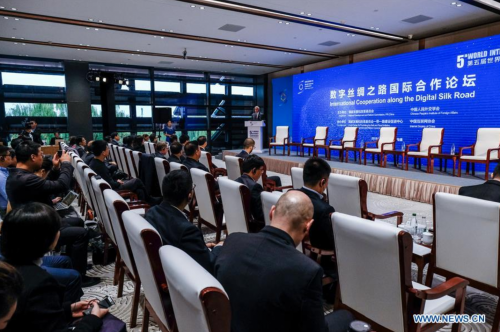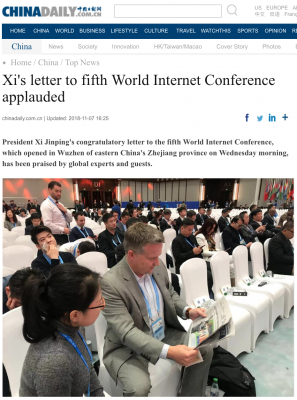The fifth World Internet Conference (WIC) concludes today in the scenic water town of Wuzhen in China’s coastal Zhejiang province. As Quartz noted yesterday, this year’s WIC seems even less worldly than previous events, with just one representative from Silicon Valley among the list of speakers.
This is corroborated if one searches through the photo library of the event provided by Xinhua News Agency and other official state media. The events seem conspicuously short on non-Chinese participation. Take, for example, the photo below from the side panel on “International Cooperation Along the Digital Silk Road.”

Predictably, the English-language China Daily has still found a way to report that foreign attendees have responded with enthusiasm to the Chinese official line, which was conveyed at the start of the conference with a welcome letter from Xi Jinping. One China Daily report quoted Kevin Collins, a managing director at the global management consulting firm Accenture, as saying that it was “very nice to see one official after another get up and say effectively the same thing that brings everyone together.”

Assuming these comments — delivered without quotation marks — are Collins’ at all, does this note about the “same thing” reflect a heartening consensus, or blind uniformity? Collin’s remarks could easily be read as ironic.
Whatever the case, it is crucial to the Chinese Communist Party, even in this era of greater apparent confidence on the international stage, to demonstrate foreign approbation of its positions.
For those of you who are not familiar (having never had your teeth pulled one by one by Global Times reporters trying to get you to say what they mean), this is the hey-foreigner-what-do-you-think genre of Chinese state media coverage. Basically, put a foreigner on the spot for a soundbite at a China-hosted event that offers general praise because an opportunity is never afforded, as in a real interview, to get down to substance.
We can almost visualise the set-up job in the photograph of Collins, in which he is pictured holding at arm’s length a copy of China Daily that was no doubt handed to him by the reporter as she inserted herself before a panel kicked off.
We can also note that Collins is a clear minority in this photograph. The attendance is overwhelmingly Chinese. This is no doubt one important reason why instructions from propaganda authorities have reportedly included a prohibition against live broadcasting of this year’s WIC. China has gone out of its way at WIC to emphasise themes such as the need to reach common trust globally over internet policy and development, and to build a “community of common destiny in the online space (网络空间命运共同体) — a mapping onto cyberspace of Xi Jinping’s foreign policy notion of a “community of common destiny [or future] for humankind.”
The theme of global destinies would hardly play well online in live broadcasts showing conference rooms full of almost exclusively Chinese. So much better to control the optics by sending young China Daily reporters off to round up foreigners and their friendly views.
So what were these foreigners supposedly so enthusiastic about? What were the lines drawn by China’s number one cyber visionary, Xi Jinping himself? The following is a translation of the summary of Xi’s welcome letter as given by the People’s Daily news app, and promoted during WIC near the top of the news at People’s Daily Online.
The core idea here is building what China sees as a fairer global community of internet governance for an expanding global digital economy, meaning that China itself has a greater say in the shape of of global cyberspace and is able to legitimise its own views on governance.
__________________
Xi Jinping Gives His Newest Assessment of Internet Development Trends and the Digital Economy
November 8, 2018
People’s Daily App
The water town of Wuzhen has again caught the attention of the world. On November 7, the Fifth World Internet Conference opened in Wuzhen. President Xi Jinping sent a letter of congratulation. While the congratulation letter was not long, it contained a wealth of information. What are the trends in world internet development? How important is the digital economy? How can countries work together to build a community of common destiny in the online space (网络空间命运共同体)?In his letter, Xi Jinping gave the newest answers.
One major trend: the world is right now undergoing another revolution in science and technology and industrial change that is larger in scale and deeper [than ever before]
Xi Jinping pointed out that the world today is right now going through another revolution in science and technology and industrial change that is larger in scale and deeper [than ever before]. In his view, the internet, big data, artificial intelligence and other modern-day information technologies are constantly making breakthroughs, the digital economy is flourishing in its development, and the interests of various countries are becoming more closely interrelated.
One assessment: In order that a new tool for world economic development can be added, the accelerated development of the digital economy is urgently needed
In his analysis of trends in the development of the internet, Xi Jinping picked out on key phrase: the digital economy (数字经济).
Xi Jinping has given the digital economy strong priority all along. At his previous letter [in 2017] to the World Internet Conference, Xi Jinping pointed out that “the development of China’s digital economy will take to the express lane,” and that [China will] “promote other countries of the world joining together in stepping aboard the internet and digital economy development express.”
At this year’s National Cyberspace Work Conference (全国网络安全和信息化工作会议), Xi Jinping emphasised: “[We] must develop the digital economy, accelerating the promotion of digital industrialisation.”
Why is the digital economy so important? Xi Jinping offered his newest assessment. He said the in order that a new tool can be added for world development, we urgently need accelerated development of the digital economy, and [we must] promote the movement of the global internet governance system in a fairer direction.
One proposal: advancing together and profiting together, taking a road of mutual trust and common governance
As a major internet nation (互联网大国), China prioritises not only its own development, but also works to build a community of destiny for the online space.
How concretely can that be done? In his letter, Xi Jinping first analysed the “three differences” and the “three similarities” between various countries in the world. While nations all have different national circumstances, their stages of internet development differ, and the actual challenges they face differ, they share a desire to promote digital economic development, and an interest in dealing with cybersecurity challenges and strengthening the governance of the online space.
On this basis, Xi Jinping raised a proposal for various countries deepening practical cooperation: with common advancement as the impetus and common benefit as the goal, traveling a path of mutual trust and common governance, making the community of common destiny in the online space more full of vitality.
One hope: allowing the people of various countries in the world benefit from the fruits of internet development
The theme of this year’s World Internet Conference is “Creating a Digital World of Mutual Trust and Common Governance: Joining Hands to Build a Community of Common Destiny in the Online Space Together” (创造互信共治的数字世界——携手共建网络空间命运共同体). In the conclusion to his letter, Xi Jinping raised one hope: the hope that everyone could pool their wisdom to enhance common understanding, together promoting global digital development, building a sustainable digital world, and allowing the fruits of internet development to enrich all the people of the world.

David Bandurski
CMP Director



















